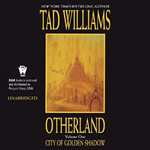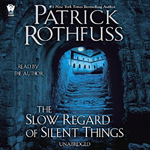
 Mountain of Black Glass (Otherland #3)
Mountain of Black Glass (Otherland #3)
By Tad Williams; Narrated by George Newbern
Publisher: Penguin Audio
Publication Date: 17 March 2015
[UNABRIDGED] – 27 hours, 17 minutes
Themes: / techno-thriller / science fiction / Greek mythology / game simulation /
Publisher summary:
Mountain of Black Glass is the third volume of Tad Williams’s highly acclaimed four-book series, Otherland. A truly unique reading experience combining elements of science fiction, fantasy, and techno-thriller, it is a rich epic tale in which virtual reality could prove the key to a whole new universe of possibilities for the entire human race – or become the exclusive domain of the rich and the ruthless as they seek a technological pathway to immortality.
The sequel to City of Golden Shadow and River of Blue Fire, this is the third installment (of 4) in the Otherland series. As with River of Blue Fire, Mountain of Black Glass picks up where the last one left off. Where I rated River of Blue Fire 3 stars (it was a solid “middle book” in a series), this one gets 4 because of the time spent in Greek mythology, something I’ve always loved.
As a “middle book” in a series, it’s hard not to say things about Mountain of Black Glass that I didn’t say in my reviews for City of Golden Shadow or River of Blue Fire. The story started with key characters still separated (as they were at the end of River of Blue Fire), though much of the book was spent either a) moving them back together, b) exploring their pasts, learning more about their history, or c) giving the reader more insight into the Otherland network itself and the motivations of the people running the network. Unlike River of Blue Fire, in this book, many details seemed to “finally” be pieced together, so more complete histories of characters were formed. It was also a transformative time for some of the Otherland network owners/operators, as they put the final pieces together to try to gain immortality. Other characters, such as the psychopathic servant of the Otherland founder also get a lot of time in this book, as do the police officers looking into his murderous ways. Sellers, the old man who remains quite a mystery but seems to be some of the force that brings the heroes together, also has a key storyline, though it took quite a different turn from what I expected going into the story.
An adventure from proverbial cover to cover (since I listened to the audiobook), a lot of time in this book was spent with the characters all trying to reach the Otherland‘s version of Troy. One of the characters is actually Odysseus, while others play key characters in the Trojan War, including Achilles, his companion Patroclus, and even Diomedes. The character who became Odysseus was forced through the Otherland simulation to re-enact Odysseus’ story somewhat in reverse, having seemingly gone through the events of The Odyssey prior to living through the Trojan War, as told in The Iliad. Our other heroes also eventually ended up in Troy, but not without enduring some trying circumstances in a few different worlds. As one might expect, though, these experiences allowed them to learn more about the network itself, and will undoubtedly help them in their quest to overthrow the Otherland founders (The Grail Brotherhood) and save the children who seem to be trapped by the network.
It’s not all sunshine and roses, though. After finally learning more about each character, becoming significantly more invested in each of them, it seems that one or more of them may have actually died through the course of the narrative. It’s hard to tell for sure, and I suspect I’ll find out what exactly happened when I finish the series with Sea of Silver Light, but the emotional gut punch was harder than I expected it would be. It’s a credit to Williams’ writing that I could simultaneously know how literally frail each of these characters are, playing a life and death game where they don’t know the rules and the rules seem to change, yet still be surprised and saddened when harm (or death) comes to a character. Or how much I really hate Dredd, the servant turned monster, preying on Otherland users/members for his own fun and games.
Tad Williams again seemed to have fun with the simulation worlds, making alternate worlds of popular stories such as the previously-mentioned The Iliad and The Odyssey. There were at least two other worlds explored in this book. One seemed to be an “empty” world, what someone might consider the null space of code to be…since the Otherland network is only code, after all, it does make some sense that the users (our heroes and our villains) would sometimes find literally empty space. There was another world, a world of a house, the reference I didn’t connect (if there was a literary reference, which I suspect that there was). Still, the worlds all felt real, were able to bring me in. This is especially true for the Trojan War. I have long been a fan of Greek mythology, and it was a fun but unexpected surprise to spend so much of this book in that world…at least, that simulated world.
The audiobook was great to listen to, if the narration was slightly slow. I listened to it slightly sped up (using the 1.5x feature for spoken word playback on my iPhone) and it seemed perfect. George Newbern does a great job making the characters come to life. Where some narrators can seem flat or one-note, he always makes it clear which character is talking, and further engages the listener by taking on the exclamation, the feeling of the words. If someone is surprised, for example, his voice lets you know it, you don’t have to rely solely on supporting descriptors. He brings the book to life.
I’m looking forward to starting into Sea of Silver Light, which is queued up and ready to go. It’s a good bit longer than any of the other books in the series (~10 hours longer than this one), but that just means I’ll have to find more excuses to listen.
Posted by terpkristin.
 River of Blue Fire (Otherland #2)
River of Blue Fire (Otherland #2) City of Golden Shadow (Otherland #1)
City of Golden Shadow (Otherland #1) The Peripheral
The Peripheral The Slow Regard of Silent Things (Kingkiller Chronicle Book 2.5)
The Slow Regard of Silent Things (Kingkiller Chronicle Book 2.5) The Magician’s Land (The Magicians #3)
The Magician’s Land (The Magicians #3)